HND Healthcare Practice: Law, Policy, and Ethical Practice Report
VerifiedAdded on 2023/01/10
|22
|5234
|57
Report
AI Summary
This report, submitted by Victoria Kwofie, analyzes the legal, policy, and ethical aspects of healthcare practice within the context of a Pearson Higher National Diploma in Healthcare Practice. The assignment covers key legislation, national and organizational policies, and their impact on health and social care. It examines the Equality Act 2010, the NHS Constitution, and the Human Rights Act 1998, alongside practical applications in patient care, including a case study of a patient with dementia. The report reflects on the challenges of implementing these policies, especially regarding safeguarding patient rights and non-discriminatory practices, and analyzes how human rights law influences equal and fair treatment in healthcare settings. The document includes observation write-ups, reflection logs, and explores the impact of equality legislation and the notion of equity on safeguarding individuals, providing a comprehensive overview of the legal and ethical considerations within the healthcare field.
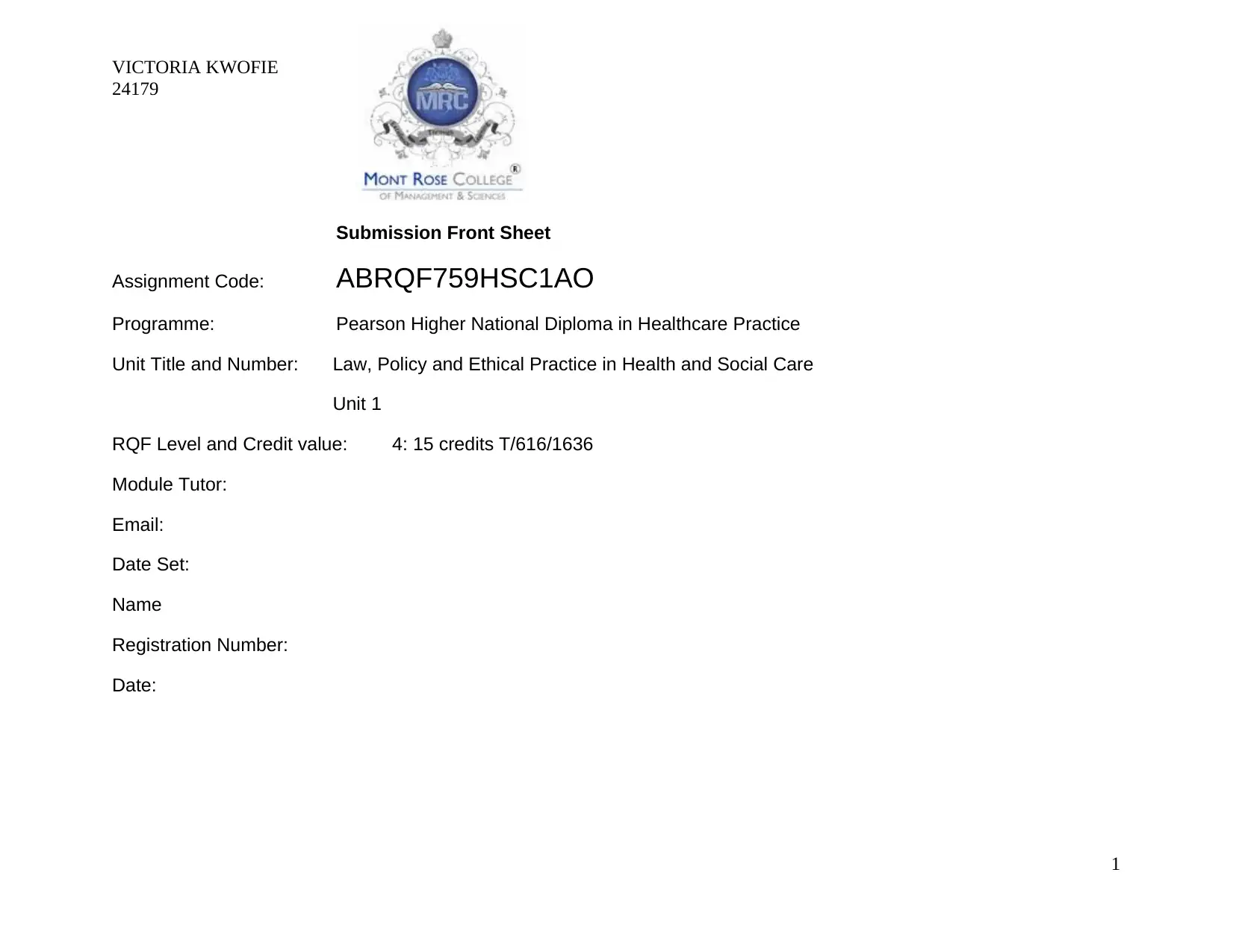
VICTORIA KWOFIE
24179
Submission Front Sheet
Assignment Code: ABRQF759HSC1AO
Programme: Pearson Higher National Diploma in Healthcare Practice
Unit Title and Number: Law, Policy and Ethical Practice in Health and Social Care
Unit 1
RQF Level and Credit value: 4: 15 credits T/616/1636
Module Tutor:
Email:
Date Set:
Name
Registration Number:
Date:
1
24179
Submission Front Sheet
Assignment Code: ABRQF759HSC1AO
Programme: Pearson Higher National Diploma in Healthcare Practice
Unit Title and Number: Law, Policy and Ethical Practice in Health and Social Care
Unit 1
RQF Level and Credit value: 4: 15 credits T/616/1636
Module Tutor:
Email:
Date Set:
Name
Registration Number:
Date:
1
Paraphrase This Document
Need a fresh take? Get an instant paraphrase of this document with our AI Paraphraser
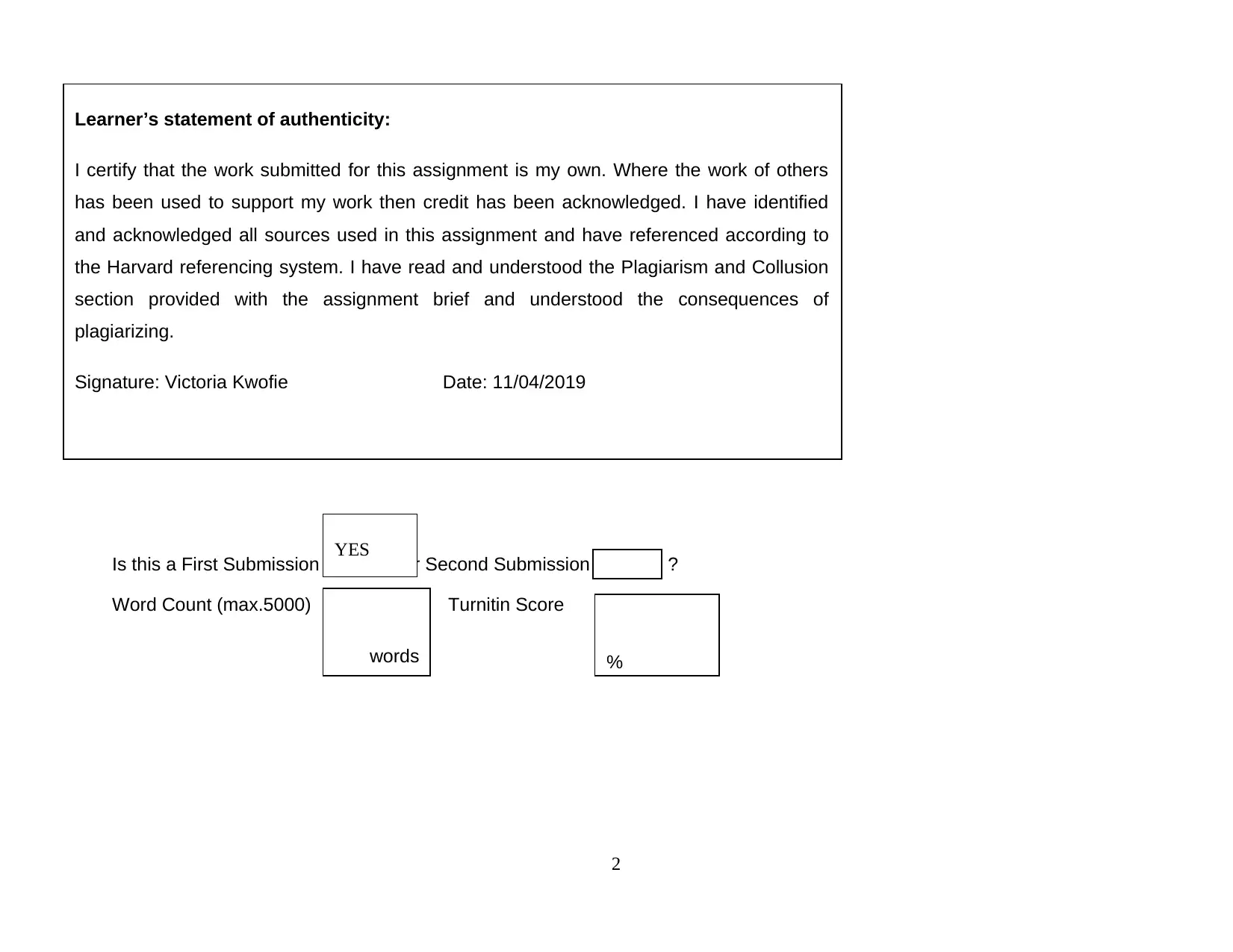
Is this a First Submission or Second Submission ?
Word Count (max.5000) Turnitin Score
2
Learner’s statement of authenticity:
I certify that the work submitted for this assignment is my own. Where the work of others
has been used to support my work then credit has been acknowledged. I have identified
and acknowledged all sources used in this assignment and have referenced according to
the Harvard referencing system. I have read and understood the Plagiarism and Collusion
section provided with the assignment brief and understood the consequences of
plagiarizing.
Signature: Victoria Kwofie Date: 11/04/2019
YES
words %
Word Count (max.5000) Turnitin Score
2
Learner’s statement of authenticity:
I certify that the work submitted for this assignment is my own. Where the work of others
has been used to support my work then credit has been acknowledged. I have identified
and acknowledged all sources used in this assignment and have referenced according to
the Harvard referencing system. I have read and understood the Plagiarism and Collusion
section provided with the assignment brief and understood the consequences of
plagiarizing.
Signature: Victoria Kwofie Date: 11/04/2019
YES
words %

3
⊘ This is a preview!⊘
Do you want full access?
Subscribe today to unlock all pages.

Trusted by 1+ million students worldwide
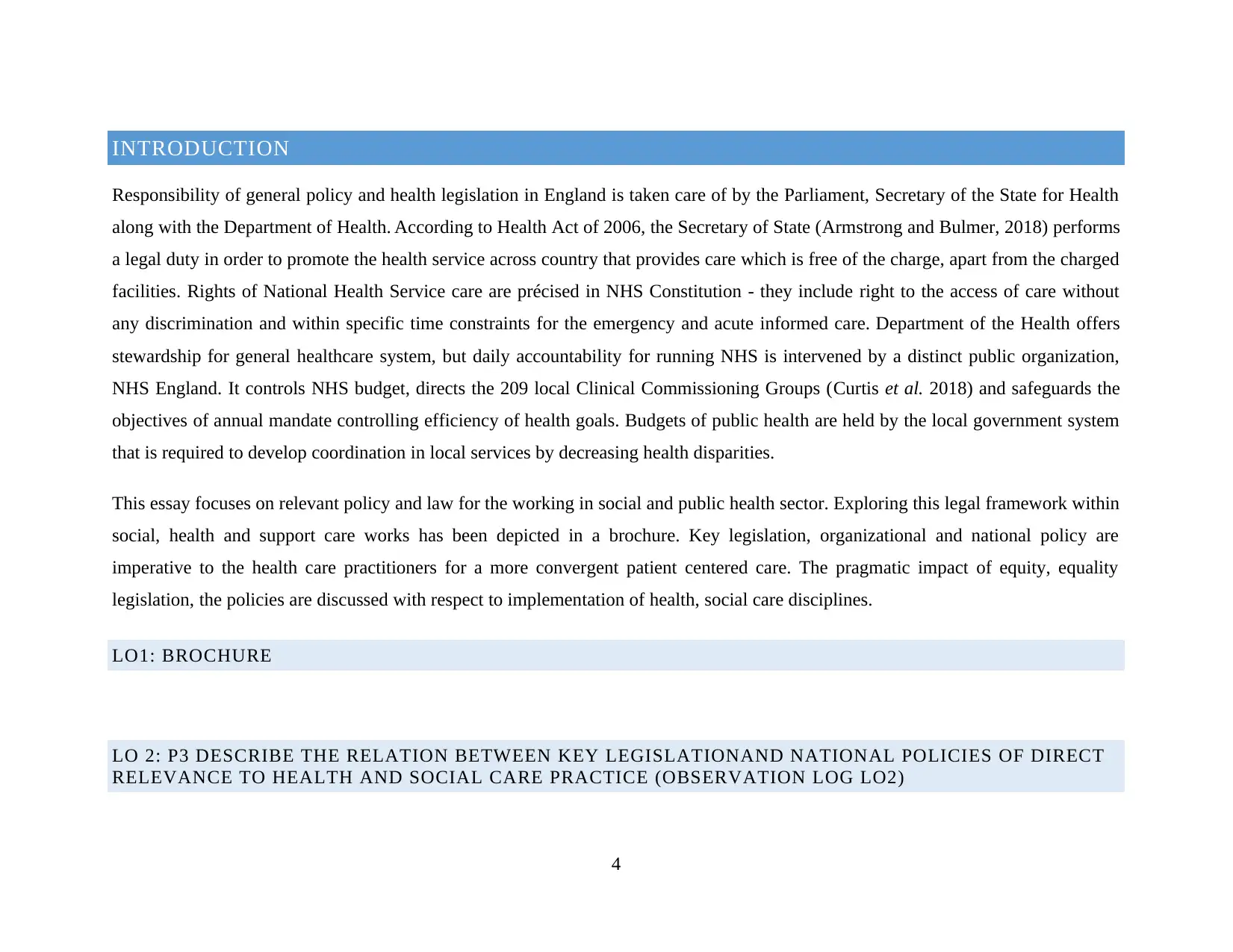
INTRODUCTION
Responsibility of general policy and health legislation in England is taken care of by the Parliament, Secretary of the State for Health
along with the Department of Health. According to Health Act of 2006, the Secretary of State (Armstrong and Bulmer, 2018) performs
a legal duty in order to promote the health service across country that provides care which is free of the charge, apart from the charged
facilities. Rights of National Health Service care are précised in NHS Constitution - they include right to the access of care without
any discrimination and within specific time constraints for the emergency and acute informed care. Department of the Health offers
stewardship for general healthcare system, but daily accountability for running NHS is intervened by a distinct public organization,
NHS England. It controls NHS budget, directs the 209 local Clinical Commissioning Groups (Curtis et al. 2018) and safeguards the
objectives of annual mandate controlling efficiency of health goals. Budgets of public health are held by the local government system
that is required to develop coordination in local services by decreasing health disparities.
This essay focuses on relevant policy and law for the working in social and public health sector. Exploring this legal framework within
social, health and support care works has been depicted in a brochure. Key legislation, organizational and national policy are
imperative to the health care practitioners for a more convergent patient centered care. The pragmatic impact of equity, equality
legislation, the policies are discussed with respect to implementation of health, social care disciplines.
LO1: BROCHURE
LO 2: P3 DESCRIBE THE RELATION BETWEEN KEY LEGISLATIONAND NATIONAL POLICIES OF DIRECT
RELEVANCE TO HEALTH AND SOCIAL CARE PRACTICE (OBSERVATION LOG LO2)
4
Responsibility of general policy and health legislation in England is taken care of by the Parliament, Secretary of the State for Health
along with the Department of Health. According to Health Act of 2006, the Secretary of State (Armstrong and Bulmer, 2018) performs
a legal duty in order to promote the health service across country that provides care which is free of the charge, apart from the charged
facilities. Rights of National Health Service care are précised in NHS Constitution - they include right to the access of care without
any discrimination and within specific time constraints for the emergency and acute informed care. Department of the Health offers
stewardship for general healthcare system, but daily accountability for running NHS is intervened by a distinct public organization,
NHS England. It controls NHS budget, directs the 209 local Clinical Commissioning Groups (Curtis et al. 2018) and safeguards the
objectives of annual mandate controlling efficiency of health goals. Budgets of public health are held by the local government system
that is required to develop coordination in local services by decreasing health disparities.
This essay focuses on relevant policy and law for the working in social and public health sector. Exploring this legal framework within
social, health and support care works has been depicted in a brochure. Key legislation, organizational and national policy are
imperative to the health care practitioners for a more convergent patient centered care. The pragmatic impact of equity, equality
legislation, the policies are discussed with respect to implementation of health, social care disciplines.
LO1: BROCHURE
LO 2: P3 DESCRIBE THE RELATION BETWEEN KEY LEGISLATIONAND NATIONAL POLICIES OF DIRECT
RELEVANCE TO HEALTH AND SOCIAL CARE PRACTICE (OBSERVATION LOG LO2)
4
Paraphrase This Document
Need a fresh take? Get an instant paraphrase of this document with our AI Paraphraser
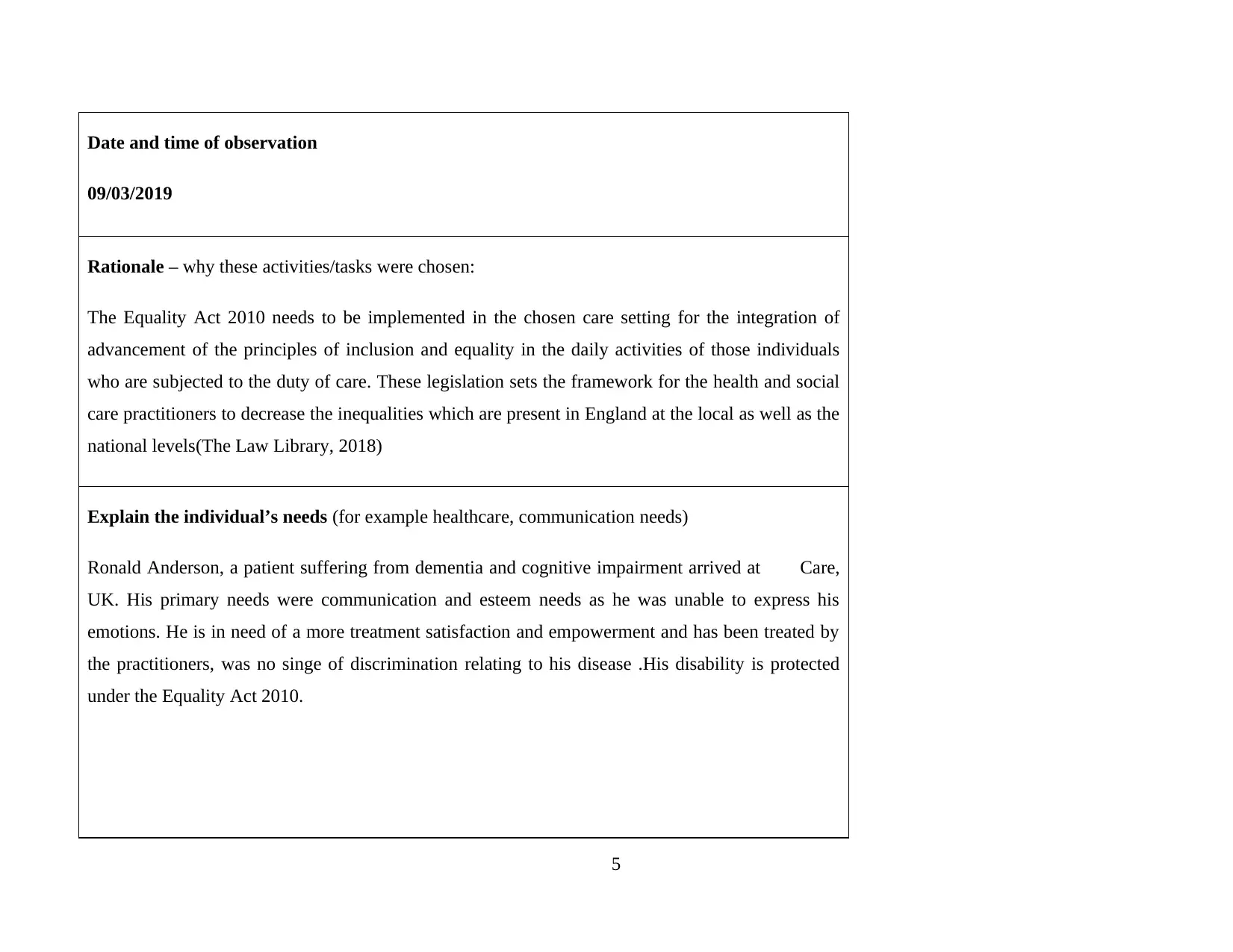
Date and time of observation
09/03/2019
Rationale – why these activities/tasks were chosen:
The Equality Act 2010 needs to be implemented in the chosen care setting for the integration of
advancement of the principles of inclusion and equality in the daily activities of those individuals
who are subjected to the duty of care. These legislation sets the framework for the health and social
care practitioners to decrease the inequalities which are present in England at the local as well as the
national levels(The Law Library, 2018)
Explain the individual’s needs (for example healthcare, communication needs)
Ronald Anderson, a patient suffering from dementia and cognitive impairment arrived at Care,
UK. His primary needs were communication and esteem needs as he was unable to express his
emotions. He is in need of a more treatment satisfaction and empowerment and has been treated by
the practitioners, was no singe of discrimination relating to his disease .His disability is protected
under the Equality Act 2010.
5
09/03/2019
Rationale – why these activities/tasks were chosen:
The Equality Act 2010 needs to be implemented in the chosen care setting for the integration of
advancement of the principles of inclusion and equality in the daily activities of those individuals
who are subjected to the duty of care. These legislation sets the framework for the health and social
care practitioners to decrease the inequalities which are present in England at the local as well as the
national levels(The Law Library, 2018)
Explain the individual’s needs (for example healthcare, communication needs)
Ronald Anderson, a patient suffering from dementia and cognitive impairment arrived at Care,
UK. His primary needs were communication and esteem needs as he was unable to express his
emotions. He is in need of a more treatment satisfaction and empowerment and has been treated by
the practitioners, was no singe of discrimination relating to his disease .His disability is protected
under the Equality Act 2010.
5
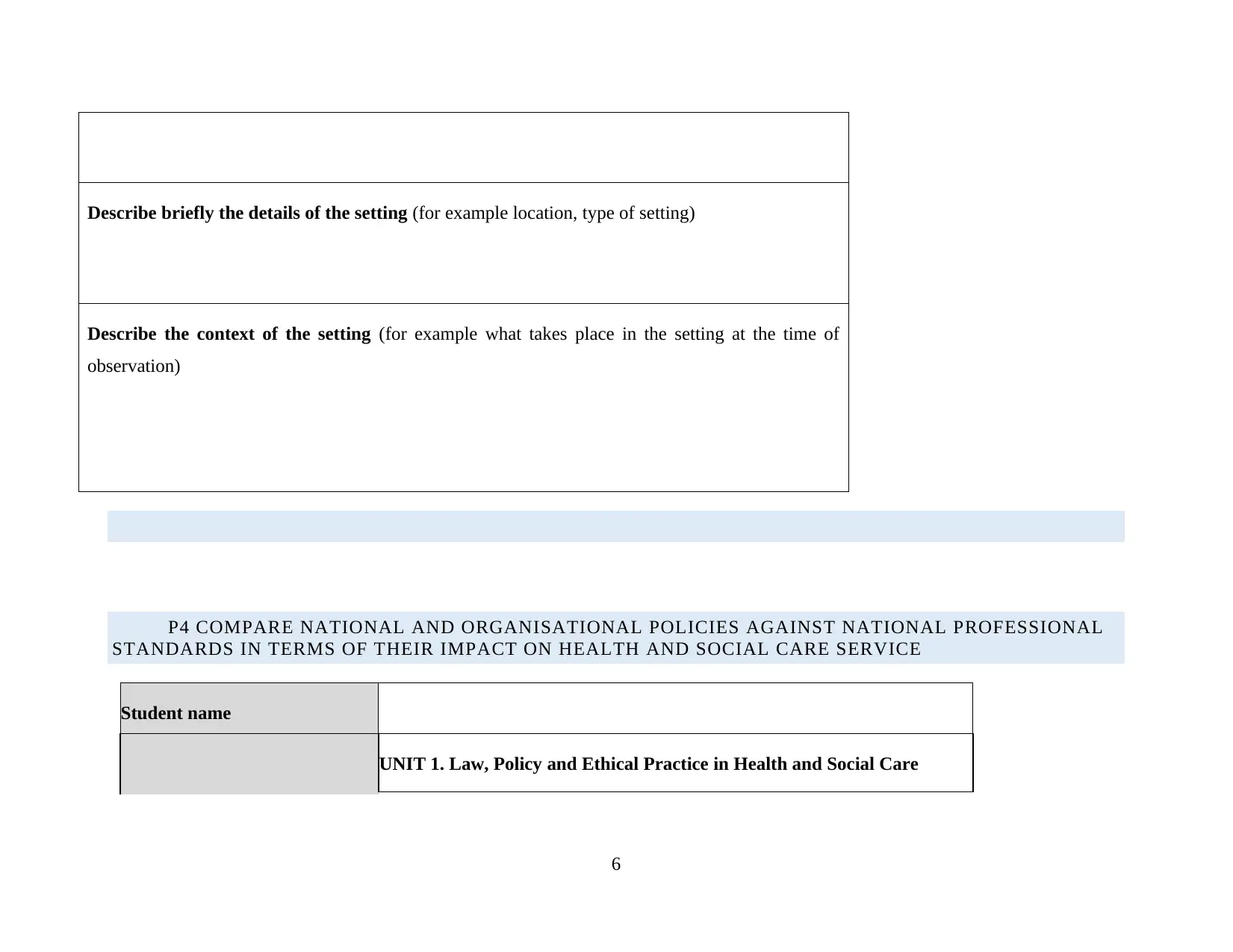
Describe briefly the details of the setting (for example location, type of setting)
Describe the context of the setting (for example what takes place in the setting at the time of
observation)
P4 COMPARE NATIONAL AND ORGANISATIONAL POLICIES AGAINST NATIONAL PROFESSIONAL
STANDARDS IN TERMS OF THEIR IMPACT ON HEALTH AND SOCIAL CARE SERVICE
Student name
UNIT 1. Law, Policy and Ethical Practice in Health and Social Care
6
Describe the context of the setting (for example what takes place in the setting at the time of
observation)
P4 COMPARE NATIONAL AND ORGANISATIONAL POLICIES AGAINST NATIONAL PROFESSIONAL
STANDARDS IN TERMS OF THEIR IMPACT ON HEALTH AND SOCIAL CARE SERVICE
Student name
UNIT 1. Law, Policy and Ethical Practice in Health and Social Care
6
⊘ This is a preview!⊘
Do you want full access?
Subscribe today to unlock all pages.

Trusted by 1+ million students worldwide
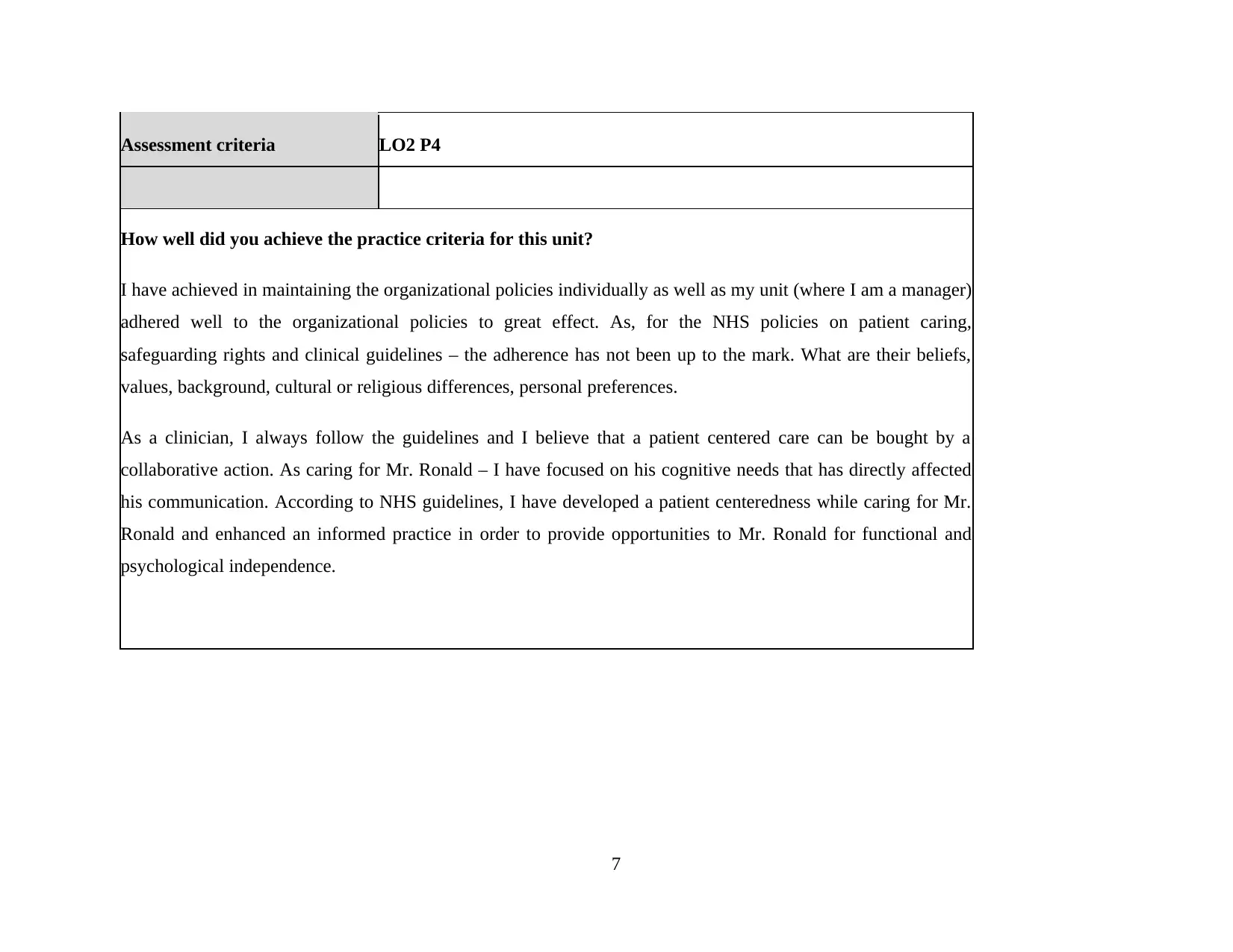
Assessment criteria LO2 P4
How well did you achieve the practice criteria for this unit?
I have achieved in maintaining the organizational policies individually as well as my unit (where I am a manager)
adhered well to the organizational policies to great effect. As, for the NHS policies on patient caring,
safeguarding rights and clinical guidelines – the adherence has not been up to the mark. What are their beliefs,
values, background, cultural or religious differences, personal preferences.
As a clinician, I always follow the guidelines and I believe that a patient centered care can be bought by a
collaborative action. As caring for Mr. Ronald – I have focused on his cognitive needs that has directly affected
his communication. According to NHS guidelines, I have developed a patient centeredness while caring for Mr.
Ronald and enhanced an informed practice in order to provide opportunities to Mr. Ronald for functional and
psychological independence.
7
How well did you achieve the practice criteria for this unit?
I have achieved in maintaining the organizational policies individually as well as my unit (where I am a manager)
adhered well to the organizational policies to great effect. As, for the NHS policies on patient caring,
safeguarding rights and clinical guidelines – the adherence has not been up to the mark. What are their beliefs,
values, background, cultural or religious differences, personal preferences.
As a clinician, I always follow the guidelines and I believe that a patient centered care can be bought by a
collaborative action. As caring for Mr. Ronald – I have focused on his cognitive needs that has directly affected
his communication. According to NHS guidelines, I have developed a patient centeredness while caring for Mr.
Ronald and enhanced an informed practice in order to provide opportunities to Mr. Ronald for functional and
psychological independence.
7
Paraphrase This Document
Need a fresh take? Get an instant paraphrase of this document with our AI Paraphraser
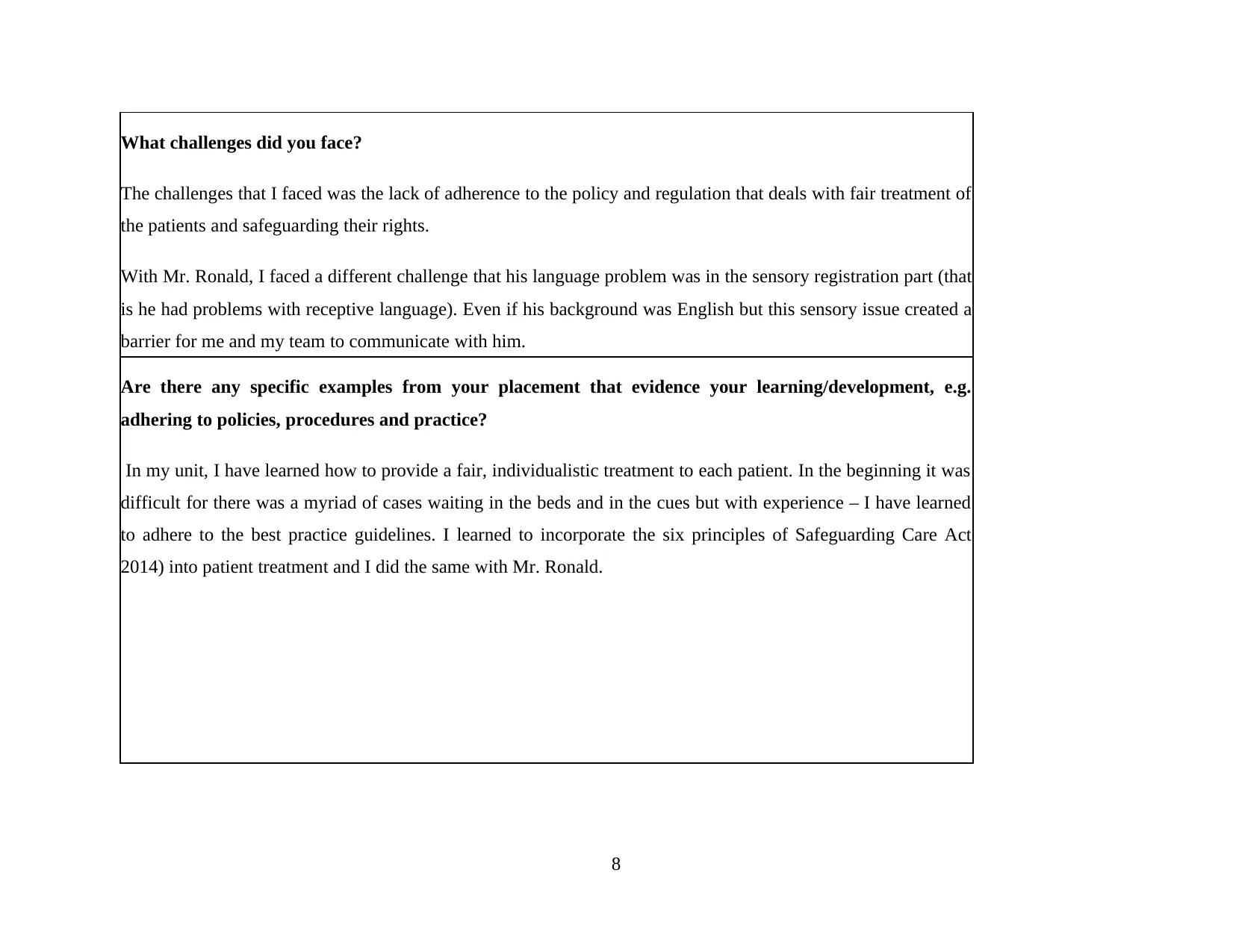
What challenges did you face?
The challenges that I faced was the lack of adherence to the policy and regulation that deals with fair treatment of
the patients and safeguarding their rights.
With Mr. Ronald, I faced a different challenge that his language problem was in the sensory registration part (that
is he had problems with receptive language). Even if his background was English but this sensory issue created a
barrier for me and my team to communicate with him.
Are there any specific examples from your placement that evidence your learning/development, e.g.
adhering to policies, procedures and practice?
In my unit, I have learned how to provide a fair, individualistic treatment to each patient. In the beginning it was
difficult for there was a myriad of cases waiting in the beds and in the cues but with experience – I have learned
to adhere to the best practice guidelines. I learned to incorporate the six principles of Safeguarding Care Act
2014) into patient treatment and I did the same with Mr. Ronald.
8
The challenges that I faced was the lack of adherence to the policy and regulation that deals with fair treatment of
the patients and safeguarding their rights.
With Mr. Ronald, I faced a different challenge that his language problem was in the sensory registration part (that
is he had problems with receptive language). Even if his background was English but this sensory issue created a
barrier for me and my team to communicate with him.
Are there any specific examples from your placement that evidence your learning/development, e.g.
adhering to policies, procedures and practice?
In my unit, I have learned how to provide a fair, individualistic treatment to each patient. In the beginning it was
difficult for there was a myriad of cases waiting in the beds and in the cues but with experience – I have learned
to adhere to the best practice guidelines. I learned to incorporate the six principles of Safeguarding Care Act
2014) into patient treatment and I did the same with Mr. Ronald.
8
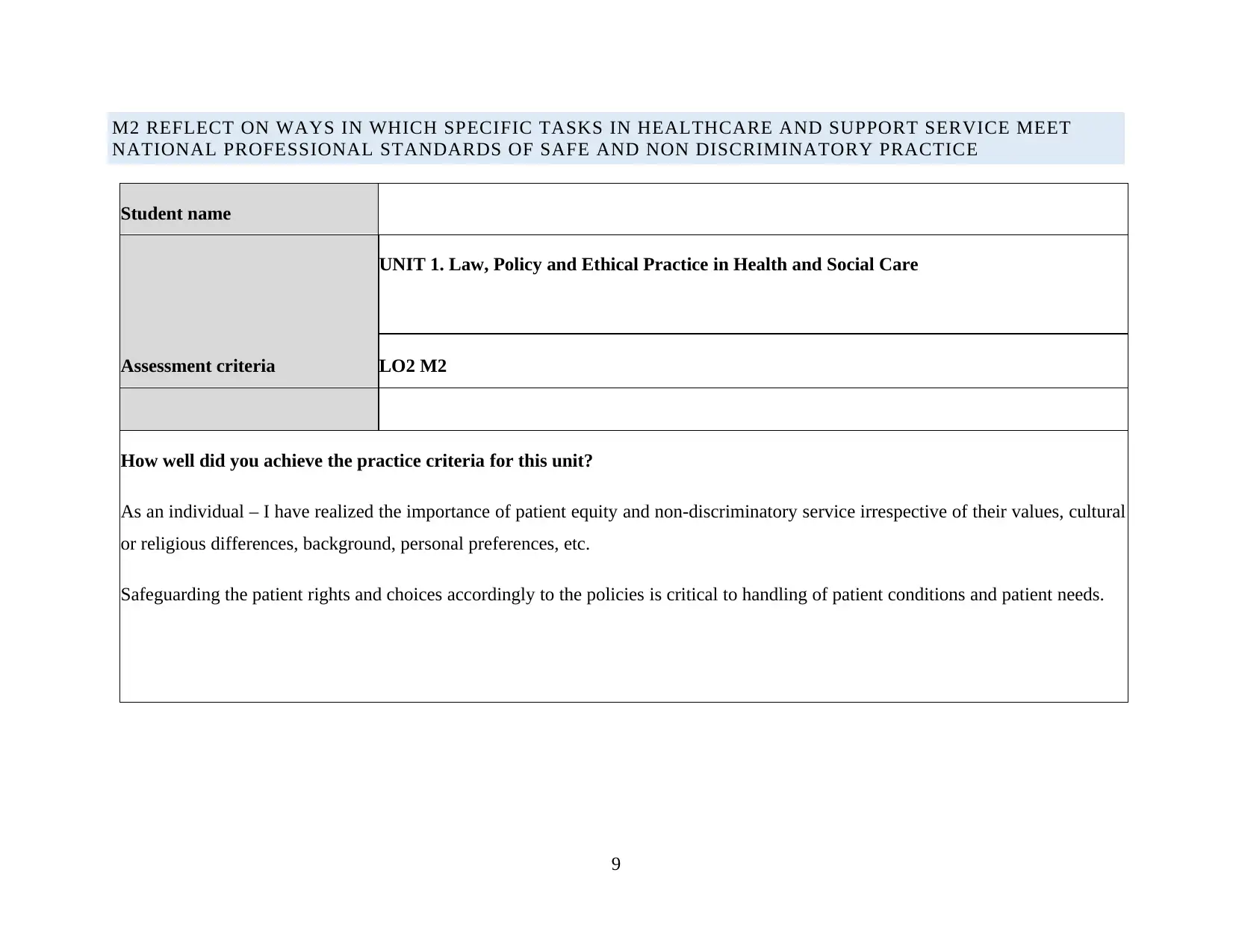
M2 REFLECT ON WAYS IN WHICH SPECIFIC TASKS IN HEALTHCARE AND SUPPORT SERVICE MEET
NATIONAL PROFESSIONAL STANDARDS OF SAFE AND NON DISCRIMINATORY PRACTICE
Student name
UNIT 1. Law, Policy and Ethical Practice in Health and Social Care
Assessment criteria LO2 M2
How well did you achieve the practice criteria for this unit?
As an individual – I have realized the importance of patient equity and non-discriminatory service irrespective of their values, cultural
or religious differences, background, personal preferences, etc.
Safeguarding the patient rights and choices accordingly to the policies is critical to handling of patient conditions and patient needs.
9
NATIONAL PROFESSIONAL STANDARDS OF SAFE AND NON DISCRIMINATORY PRACTICE
Student name
UNIT 1. Law, Policy and Ethical Practice in Health and Social Care
Assessment criteria LO2 M2
How well did you achieve the practice criteria for this unit?
As an individual – I have realized the importance of patient equity and non-discriminatory service irrespective of their values, cultural
or religious differences, background, personal preferences, etc.
Safeguarding the patient rights and choices accordingly to the policies is critical to handling of patient conditions and patient needs.
9
⊘ This is a preview!⊘
Do you want full access?
Subscribe today to unlock all pages.

Trusted by 1+ million students worldwide
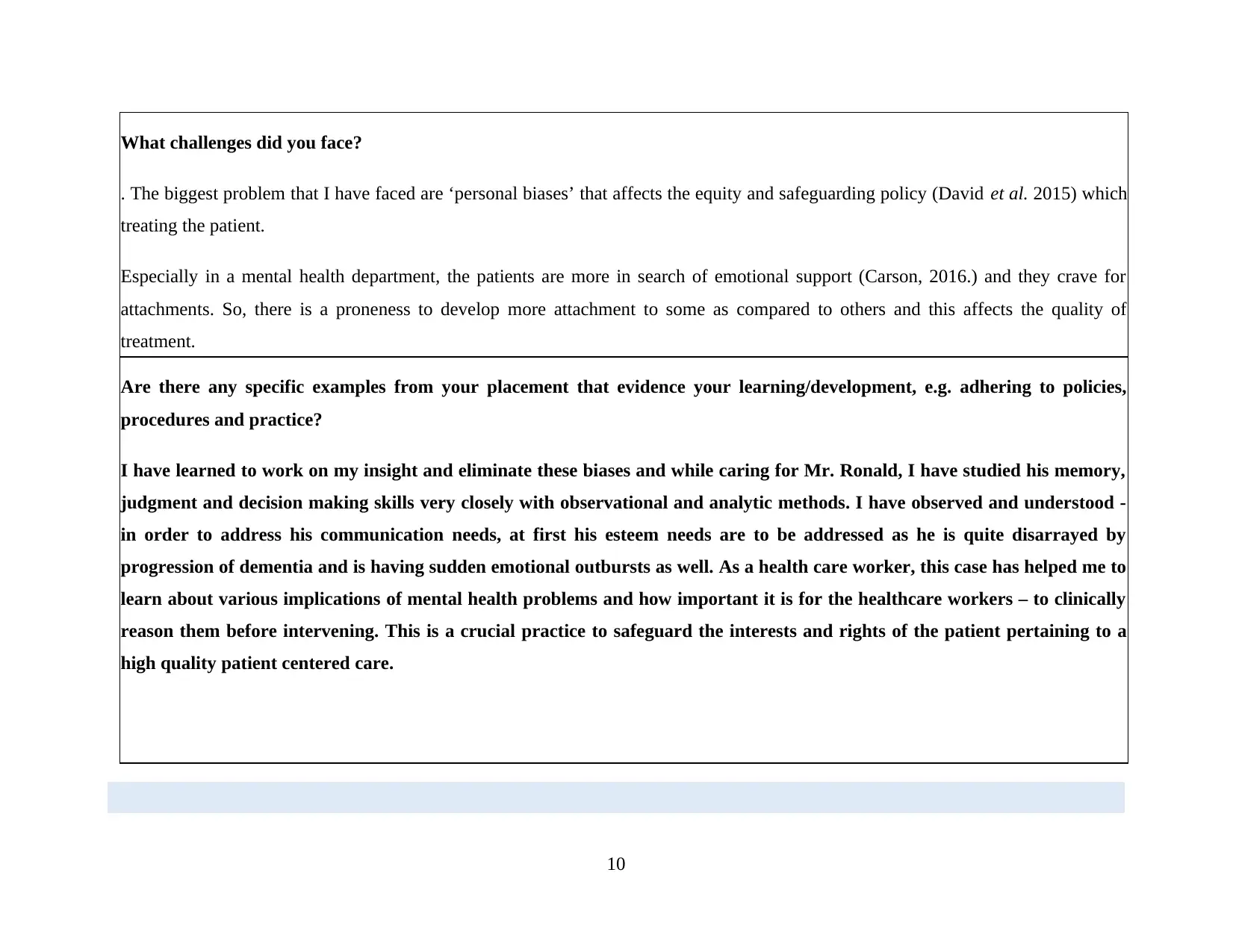
What challenges did you face?
. The biggest problem that I have faced are ‘personal biases’ that affects the equity and safeguarding policy (David et al. 2015) which
treating the patient.
Especially in a mental health department, the patients are more in search of emotional support (Carson, 2016.) and they crave for
attachments. So, there is a proneness to develop more attachment to some as compared to others and this affects the quality of
treatment.
Are there any specific examples from your placement that evidence your learning/development, e.g. adhering to policies,
procedures and practice?
I have learned to work on my insight and eliminate these biases and while caring for Mr. Ronald, I have studied his memory,
judgment and decision making skills very closely with observational and analytic methods. I have observed and understood -
in order to address his communication needs, at first his esteem needs are to be addressed as he is quite disarrayed by
progression of dementia and is having sudden emotional outbursts as well. As a health care worker, this case has helped me to
learn about various implications of mental health problems and how important it is for the healthcare workers – to clinically
reason them before intervening. This is a crucial practice to safeguard the interests and rights of the patient pertaining to a
high quality patient centered care.
10
. The biggest problem that I have faced are ‘personal biases’ that affects the equity and safeguarding policy (David et al. 2015) which
treating the patient.
Especially in a mental health department, the patients are more in search of emotional support (Carson, 2016.) and they crave for
attachments. So, there is a proneness to develop more attachment to some as compared to others and this affects the quality of
treatment.
Are there any specific examples from your placement that evidence your learning/development, e.g. adhering to policies,
procedures and practice?
I have learned to work on my insight and eliminate these biases and while caring for Mr. Ronald, I have studied his memory,
judgment and decision making skills very closely with observational and analytic methods. I have observed and understood -
in order to address his communication needs, at first his esteem needs are to be addressed as he is quite disarrayed by
progression of dementia and is having sudden emotional outbursts as well. As a health care worker, this case has helped me to
learn about various implications of mental health problems and how important it is for the healthcare workers – to clinically
reason them before intervening. This is a crucial practice to safeguard the interests and rights of the patient pertaining to a
high quality patient centered care.
10
Paraphrase This Document
Need a fresh take? Get an instant paraphrase of this document with our AI Paraphraser
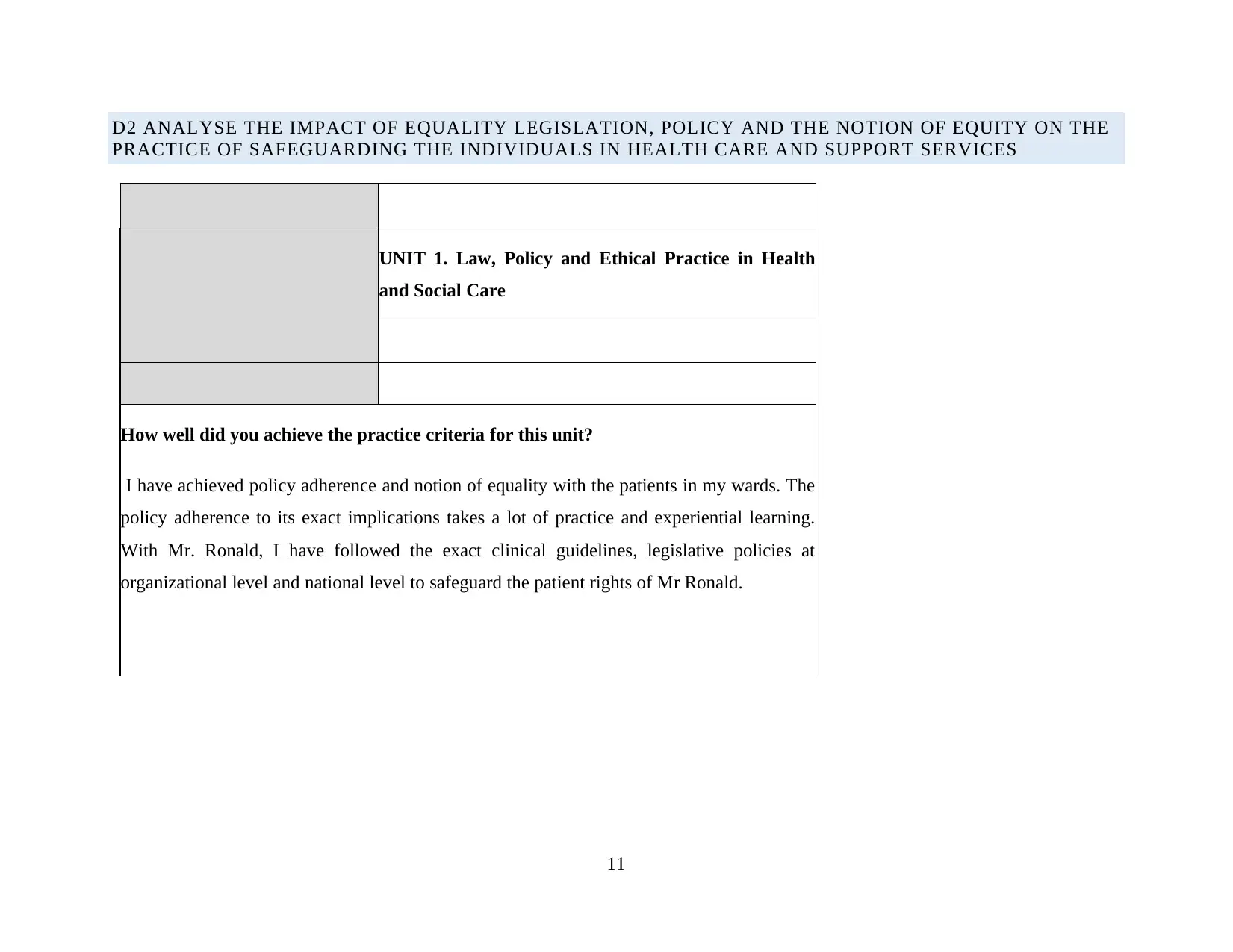
D2 ANALYSE THE IMPACT OF EQUALITY LEGISLATION, POLICY AND THE NOTION OF EQUITY ON THE
PRACTICE OF SAFEGUARDING THE INDIVIDUALS IN HEALTH CARE AND SUPPORT SERVICES
UNIT 1. Law, Policy and Ethical Practice in Health
and Social Care
How well did you achieve the practice criteria for this unit?
I have achieved policy adherence and notion of equality with the patients in my wards. The
policy adherence to its exact implications takes a lot of practice and experiential learning.
With Mr. Ronald, I have followed the exact clinical guidelines, legislative policies at
organizational level and national level to safeguard the patient rights of Mr Ronald.
11
PRACTICE OF SAFEGUARDING THE INDIVIDUALS IN HEALTH CARE AND SUPPORT SERVICES
UNIT 1. Law, Policy and Ethical Practice in Health
and Social Care
How well did you achieve the practice criteria for this unit?
I have achieved policy adherence and notion of equality with the patients in my wards. The
policy adherence to its exact implications takes a lot of practice and experiential learning.
With Mr. Ronald, I have followed the exact clinical guidelines, legislative policies at
organizational level and national level to safeguard the patient rights of Mr Ronald.
11
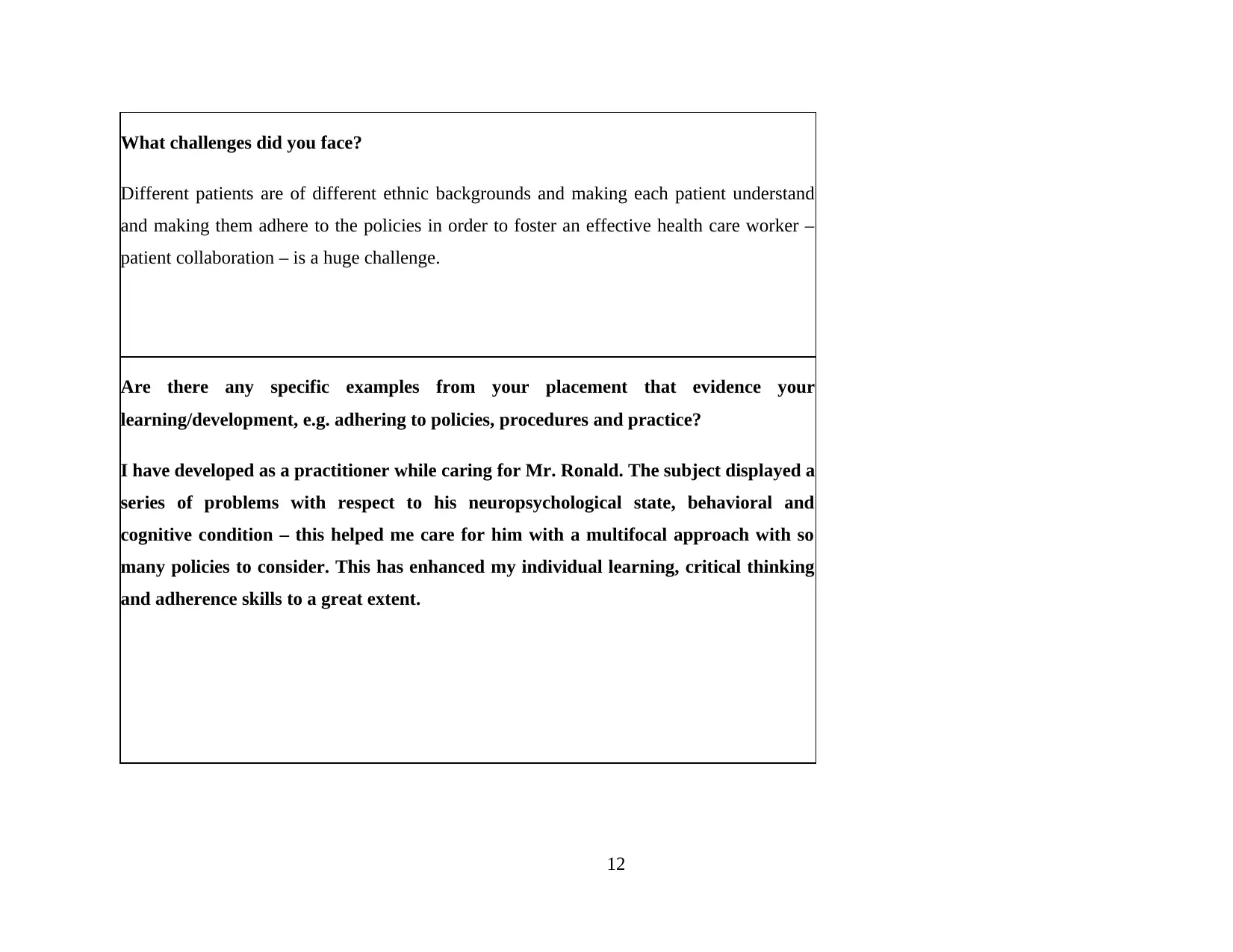
What challenges did you face?
Different patients are of different ethnic backgrounds and making each patient understand
and making them adhere to the policies in order to foster an effective health care worker –
patient collaboration – is a huge challenge.
Are there any specific examples from your placement that evidence your
learning/development, e.g. adhering to policies, procedures and practice?
I have developed as a practitioner while caring for Mr. Ronald. The subject displayed a
series of problems with respect to his neuropsychological state, behavioral and
cognitive condition – this helped me care for him with a multifocal approach with so
many policies to consider. This has enhanced my individual learning, critical thinking
and adherence skills to a great extent.
12
Different patients are of different ethnic backgrounds and making each patient understand
and making them adhere to the policies in order to foster an effective health care worker –
patient collaboration – is a huge challenge.
Are there any specific examples from your placement that evidence your
learning/development, e.g. adhering to policies, procedures and practice?
I have developed as a practitioner while caring for Mr. Ronald. The subject displayed a
series of problems with respect to his neuropsychological state, behavioral and
cognitive condition – this helped me care for him with a multifocal approach with so
many policies to consider. This has enhanced my individual learning, critical thinking
and adherence skills to a great extent.
12
⊘ This is a preview!⊘
Do you want full access?
Subscribe today to unlock all pages.

Trusted by 1+ million students worldwide
1 out of 22
Related Documents
Your All-in-One AI-Powered Toolkit for Academic Success.
+13062052269
info@desklib.com
Available 24*7 on WhatsApp / Email
![[object Object]](/_next/static/media/star-bottom.7253800d.svg)
Unlock your academic potential
Copyright © 2020–2026 A2Z Services. All Rights Reserved. Developed and managed by ZUCOL.




